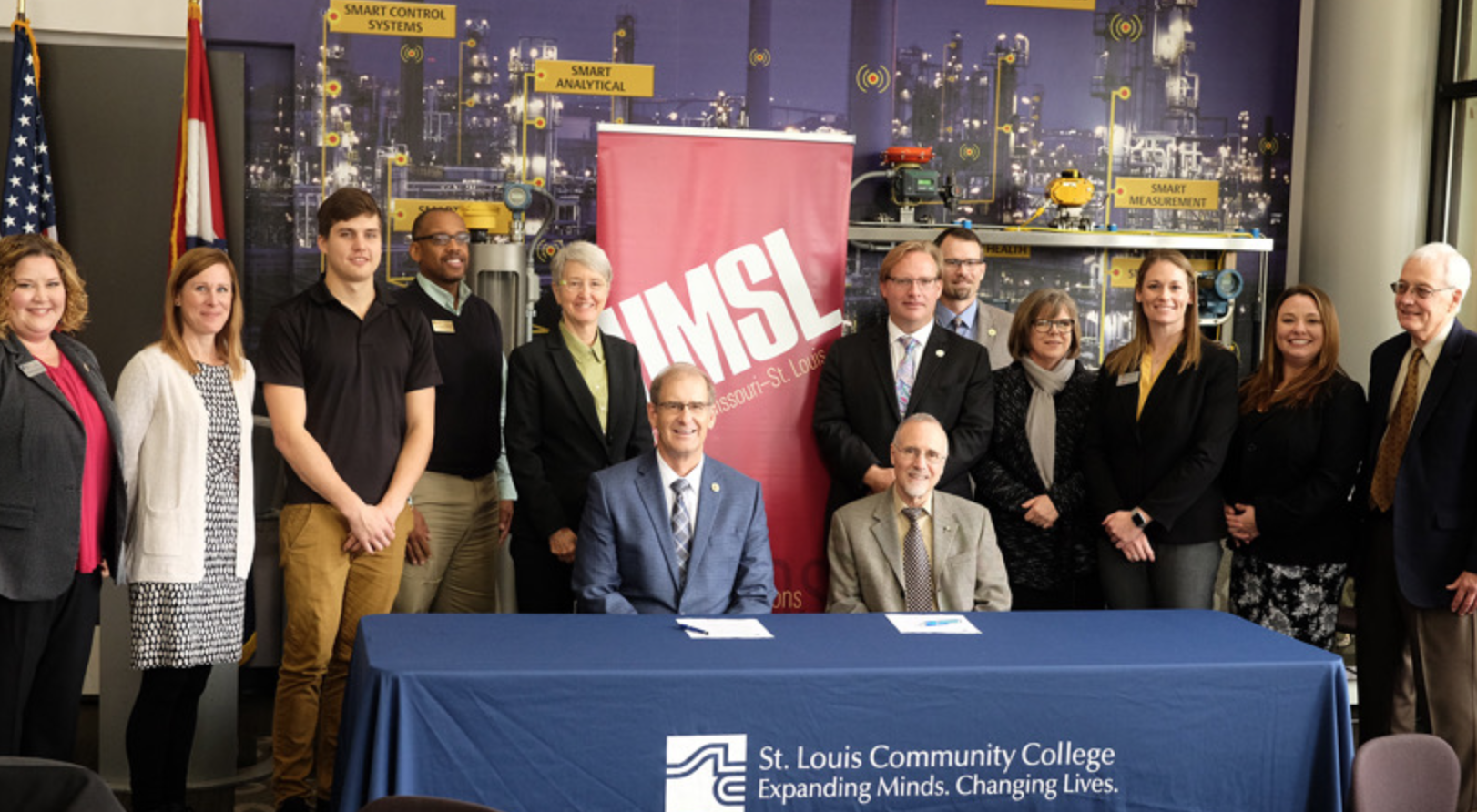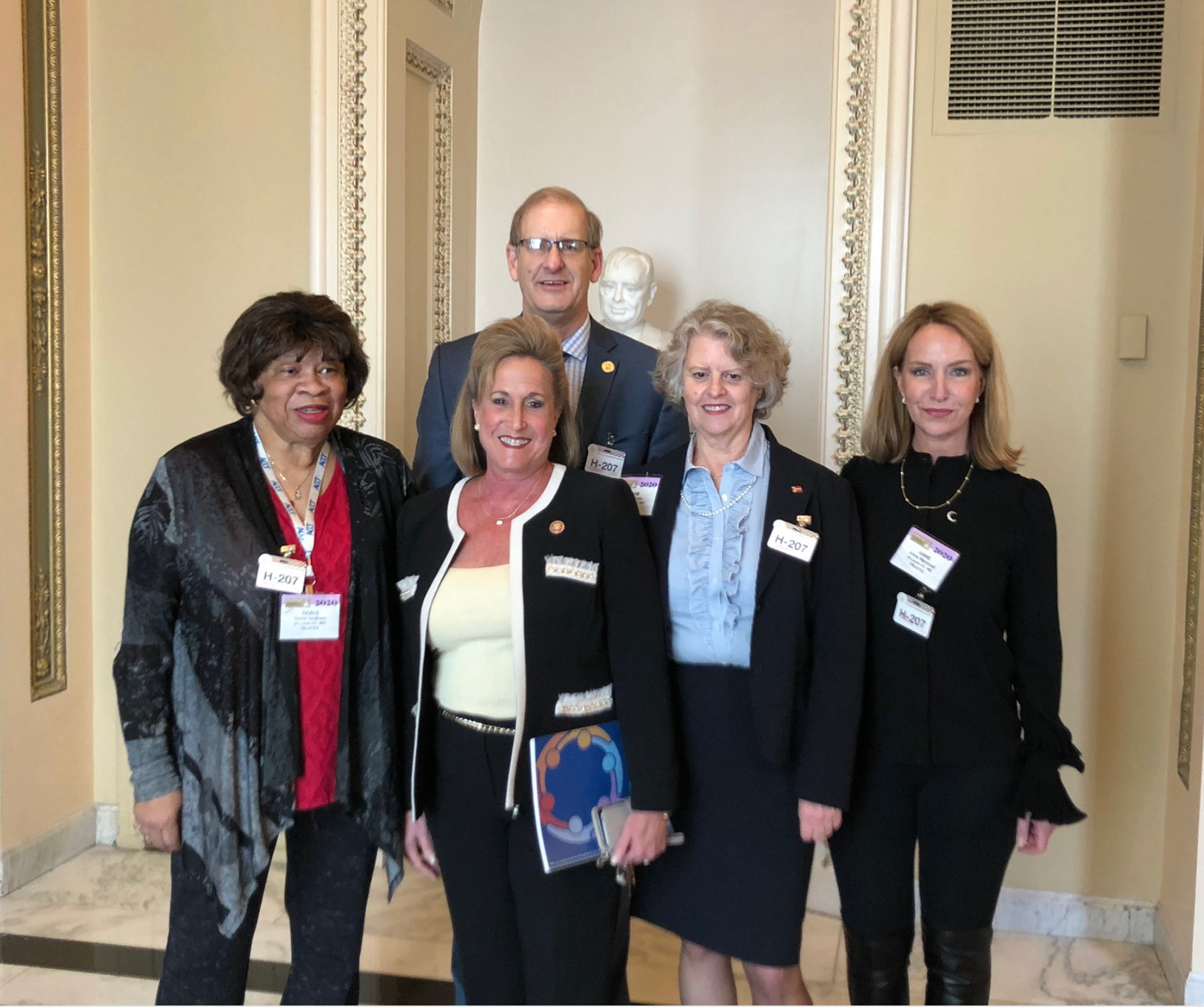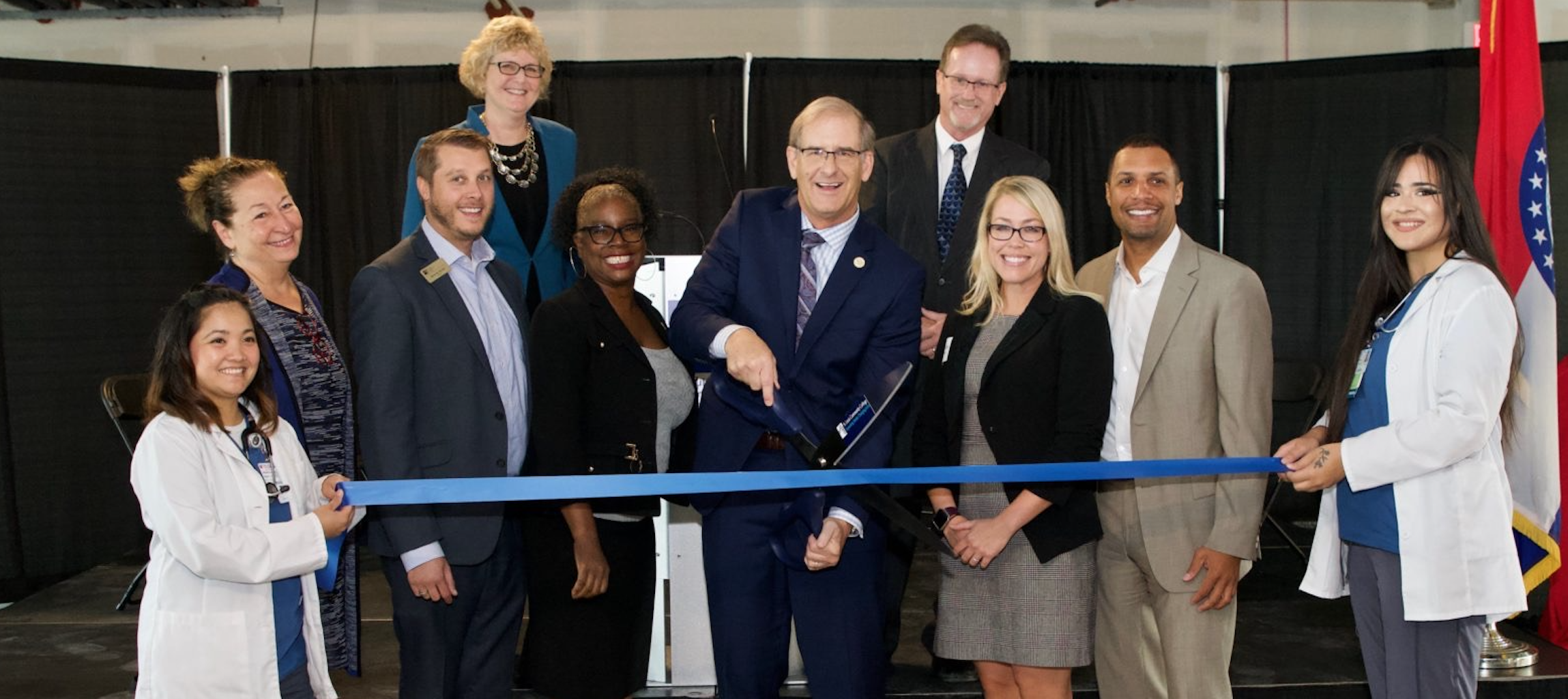ST. LOUIS — Dr. Jeff Pittman is the epitome of the St. Louis Community College motto: “Expanding minds. Changing Lives.”
When he inherited the leadership of the largest community college in the state in 2015, it was languishing. Pittman was the fifth chancellor in eight years. But since coming to St. Louis from Indiana, Pittman has deftly implemented his mission of stability and efficiency to St. Louis Community College (STLCC).
The multi-million-dollar budget deficit has been erased, and today the budget stands balanced from a series of cost reduction efforts, including rightsizing staffing levels and eliminating administrative duplications. Since 2015, the college has reduced its expenses by $15 million, Pittman said.
In an effort to streamline the community college process, Pittman introduced the school to the Guided Pathways model, an approach that connects students throughout the collegiate process to improve retention.
“It’s removing barriers on the front end for students. It’s doing things like making the registration process simpler, helping students complete the FAFSA, getting them enrolled in the right classes that they need, assigning an education coach for the student as they go all the way through their educational journey,” Pittman said. “It’s not the old model of community colleges where you provide students with minimal advising throughout their time at the college.”
Pittman was born and raised in Bloomfield, Indiana, a rural area close to a large Naval weapons manufacturing center that requires the types of workers the community college system trains.
“I really like the system we have here in Missouri. While I was in Indiana, I started out as a teacher and faculty member. Eventually, I was chancellor of the Terre Haute region for 13 years,” Pittman said.
In Missouri, the community college system is segmented into 12 districts. STLCC includes all of St. Louis city and county as well as small parts of adjoining counties. It has the largest taxing base of any community college in the state. Because of that and some effective budgeting, the system has been able to maintain a $122 credit hour for all courses — one of the lowest in the state.

Pittman is famous for a quote too blunt to have been often heard in academia: “Unless you hate money, why would you not go here?”
However, all of the innovations have not been focused on correcting the budget. STLCC has begun a series of partnerships to innovate its course offerings.
It has upgraded its presence in state government, enabling the system to get several state grants and some from MoExcels. Gov. Mike Parson recently provided the college a $4 million grant for a new childcare center, removing a huge roadblock for students at the Forest Park Campus. But one of its most successful partnerships has been its relationship with LaunchCode, a company that provides IT training and is headquartered in St. Louis.
The partnership utilizes LaunchCode’s innovative curriculum and has allowed the college to train workers who are needed the day they graduate. The curriculum is taught over a 14-week period as a full-time cohort-based class. It starts off with 20 students and realizes an amazingly high graduation rate. It also provides students with transportation support and offers other measures of financial assistance if needed.
There are approximately 2,000 coding position vacancies right now in St. Louis, and the partnership with LaunchCode will assist in filling these positions.
“Any community has to be ready when an economic development opportunity arises. Now more than ever, that means having the right workforce training facilities and programs,” said Rob Dixon, director of the Missouri Department of Economic Development. “Dr. Pittman understands that workforce training is the best economic development strategy there is.”
STLCC has also embraced a cohort system to help students not just in the classroom.
“This is the model of wrapping support around students and having a defined pathway and cohorts — the value of students being together,” Pittman stated. “I can’t begin to describe the value of that.”
STLCC is expanding health care services and food programs for students and developing family resource centers in an effort to put all those services into one place. STLCC has begun hiring social workers; as the college has never employed social workers in the past, it has started with hiring one for each campus to help students with life challenges.
“The dialog about social workers and student success coaches began a while back, and every year it’s just grown. These are the things that help a student with staying and completing. When you have this coach that helps you along the way, that is what gets the student through and is successful,” said Kedra Tolson executive director of Marketing and Communications with STLCC. “With sustainability and leadership, you’re able to gain traction, and every year it grows and gets better.”
A key goal of the entire leadership team is to show students how to make education a part of their life and not simply an added burden.
That plan has focused on removing barriers on the front end for students. It has included making the registration process simpler, helping students complete the FAFSA, getting them enrolled in the right classes, and assigning an education coach for the student as they go all the way through their educational journey. It’s not the old model of community colleges where students have minimal guidance but a holistic design of assisting students with every part of their lives.
The average community college student usually completes 15-18 credit hours too many for their program because they haven’t been on a Guided Pathway to stay on track. At STLCC, the health care programs are the most regimented, and these students graduate on time with the right credits — eliminating wasted time and costs.
“We need to make all of our programming this efficient,” Pittman said.

One area of growth within the college has been the increase in high school students earning dual credit.
“We saw the relationship grow between school counselors and college administrators and the relationships gained with school systems,” said Tolson. “So when you start to talk about opportunities for kids it becomes, ‘We’re all on board with that; how do we make it happen?’”
“With our early college students, we found they should come in cohorts and not as individual students,” she continued. “It was nice that they came in groups so it would be this group of students that come together and carpool because that was the sense of safety some of the parents needed and wanted.”
When Pittman got to STLCC, he had employees work as a college to put together a strategic plan that has evolved over the years. STLCC recently completed a master facility plan that is comprehensive in nature and allows flexibility with what can be done with each campus.
“Dr. Pittman has proven to be an asset to St. Louis Community College as his innovative leadership has been so beneficial to his students and the community,” Rep. Jim Murphy said. “His dual enrollment program has given many high school students a very valuable head start.”
Those innovations and reforms — combined with the renewed confidence Pittman has instilled in the college — have led to Proposition R.
The transformation has set the stage to do more with Prop R
All of the transformations of the past six years have led the St. Louis business community to encourage STLCC to increase its role in training the skilled workforce they are seeking. The end result is Prop R that is on the ballot this week.
“We have the opportunity to be an area of real growth if we can prepare our workforce,” Pittman said. “Companies that consider moving here are asking, ‘Can we recruit the people that we need who are committed to the community?’ And I think the St. Louis Community College already has demonstrated a track record of achievement that’s very compelling.”
Previously, STLCC’s district publicly-set levy was around 30 cents. A state law change lowered that without a vote of the district. Prop R would simply return that levy to just below what it was previously.

Dr. Mark Wrighton, chancellor emeritus of Washington University in St. Louis, has led the campaign for Prop R.
“I’ve been involved in higher education for nearly 50 years. I believe the work that is being done by Dr. Pittman and STLCC is vital to our community to provide the workforce we need to grow, and I believe Prop R is the right investment in the future of the St. Louis area,” Wrighton said.
Beginning in 2020, Wrighton was involved in a community-wide effort to consider how to bring about new jobs and inclusive economic growth. The initiative was originally led by business development organizations. The result of that work was to bring to the forefront the need for workforce development and a talented group of people to take the jobs.
“We still have a large number of underemployed and unemployed people who can benefit enormously from the kind of education and training that takes place right here at St. Louis Community College. There are shortages, and I believe that in order for us to support the growth of businesses in this region and to attract new businesses, we have to be able to have a talented, diverse, and well-prepared workforce,” Wrighton said.
“I’ve been involved in the Donald Danforth Plant Science Center that is today the No. 1 largest plant science start-up center in the world,” he continued. “They need educated [and] trained science technicians, and the community college partnered. Vincent Hill is a start-up community. It’s a so-called unicorn coming out of the Danforth Plant Science Center — a unicorn meaning it’s going to be valued at over $1 billion. Their corporate headquarters is out there in Creve Coeur right by the Danforth Plant Science Center. They already have significant employment. It’s biotechnology, and in order to prepare people to work in the biotechnology areas, you need specialized facilities. The community college on each of its four campuses with Proposition R will have the opportunity to enhance their facilities and prepare for this expanded employment opportunity in biotechnology.”
With an 8 cent increase, Prop R is estimated to add $24 million to the college’s budget annually. The current levy is set at just less than 20 cents, and Prop. R would raise it to 28 cents — making it still one of the lowest in the state for community colleges.
“If Prop R were to pass, this would modernize the campuses with expanded programs in health care, IT, financial services, biotechnology, and manufacturing, and will enable a bonding capacity of $350 million,” Wrighton said. “The support that comes in the short run will enable the college to modernize outdated facilities … and redevelop campuses in the next four or five years. There will be many jobs that are created in the construction sector. A lot of redevelopment will take place as the current campuses need to be updated to provide students with real-world work environments.”
“Supporting Proposition R is an easy choice when I consider Chancellor Pittman’s leadership of the community college. Dr. Pittman has demonstrated a bold vision for innovation. He’s aggressively sought and embraced new models of education and job training that push outside beyond conventional programs,” said LaunchCode Executive Director Jeff Mazur. “He’s led the college to be a genuine partner and investor in accelerated, accessible non-credit opportunities like the ones our organizations work on together which is aimed squarely at solving a huge regional talent problem. St. Louis is fortunate to have Dr. Pittman helping shape the workforce at a pivotal moment for our community.”
Thus far, the business community hasn’t just encouraged STLCC to grow its degree programs. It has put its money where its mouth is. Several big employers such as Enterprise, Centene, Ameren, Washington University, and St. Louis University have contributed to the campaign. Almost every building trade has signed on. Mercy Hospital made a large donation last week.
“There is an education gap, and if we don’t close it, we can’t be competitive as a region. It is really is a critical thing. That’s why I got involved in this, and the chancellor has inspired our community to know how important the community college is in closing this gap,” Wrighton said.
Scott Faughn is the publisher of The Missouri Times, owner of the Clayton Times in Clayton; SEMO Times in Poplar Bluff; and host of the only statewide political television show, This Week in Missouri Politics.
























